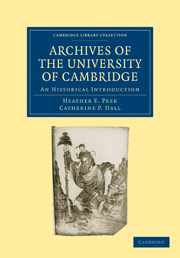Book contents
- Frontmatter
- Contents
- List of Plates
- Preface
- PART I
- PART II
- 4 The University and Colleges as Privileged Corporations
- 5 Records of University Administration
- 6 Records of Matriculation and Degrees
- 7 Financial Records of the University
- 8 Endowments of the University
- 9 University Officers and their Records
- 10 Records of the University Courts
- 11 Records of University Jurisdiction in the Town of Cambridge
- 12 The Relations between the Crown and the University
- 13 Other University Institutions and their Records
- APPENDICES
- Index
- Index to Muniments of Title in Appendix B
- Plate section
10 - Records of the University Courts
Published online by Cambridge University Press: 07 September 2010
- Frontmatter
- Contents
- List of Plates
- Preface
- PART I
- PART II
- 4 The University and Colleges as Privileged Corporations
- 5 Records of University Administration
- 6 Records of Matriculation and Degrees
- 7 Financial Records of the University
- 8 Endowments of the University
- 9 University Officers and their Records
- 10 Records of the University Courts
- 11 Records of University Jurisdiction in the Town of Cambridge
- 12 The Relations between the Crown and the University
- 13 Other University Institutions and their Records
- APPENDICES
- Index
- Index to Muniments of Title in Appendix B
- Plate section
Summary
The exercise of an independent jurisdiction in the regulation of its affairs and in the disciplining and protection of its members was, in the Middle Ages, a generally coveted privilege, to which many autonomous corporations aspired, and which constituted a source both of pride and of profit to the community which enjoyed it. Much of the early history of Cambridge university can be regarded as part of a long struggle for the establishment and extension of such a jurisdiction, which should be on the one hand free from the interference of the lay or common law system (represented by the royal justices and the local courts of the borough) and on the other hand independent of the higher ecclesiastical courts, of which the chancellor's court had originally been a humble offshoot. The university would not of itself have been sufficiently wealthy or powerful to achieve such a position had it not been fortunate enough to enjoy the support and patronage of the crown and of the pope, shown in the long series of royal and episcopal charters (chapter 4). By their aid, however, what was at first a very necessary protection for the university in hostile surroundings, and later primarily an affair of honour, was operating in the later medieval and Tudor periods as a flourishing system of courts, based on the privileged jurisdiction of the chancellor.
- Type
- Chapter
- Information
- Archives of the University of CambridgeAn Historical Introduction, pp. 48 - 52Publisher: Cambridge University PressPrint publication year: 1963First published in: 1962



